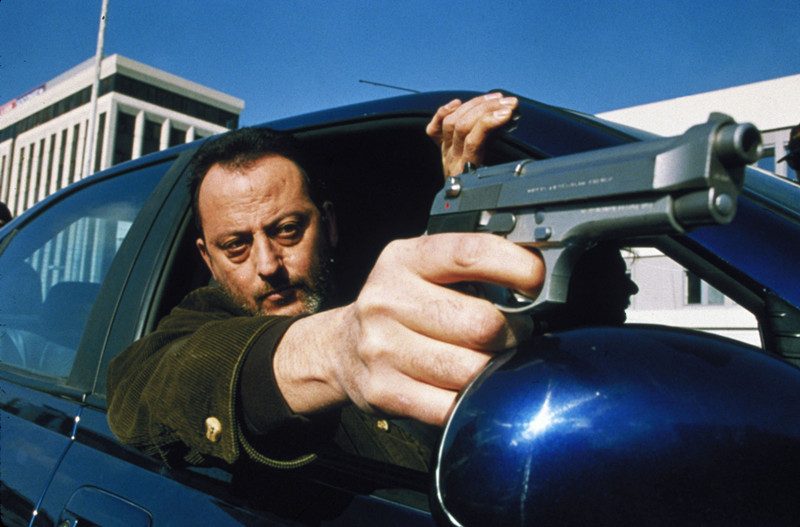
For this list, the usual suspects had to be rounded up: The Duke, Lee Marvin, Sly Stallone, The Governator, Bruce Willis, Walter Hill, Clint Eastwood, and all the rest of these awesome bastards. Being an action buff myself, so many films came to mind when assembling this list. You can’t really do the subject justice with just 10 films, but I did my best.
I decided to make the list diverse. There’s a western in here, a war movie, a buddy-cop action movie, a one-man army movie, even a badass historical epic. It needed to be filled with a few films that even pretentious film buffs could enjoy. They wouldn’t feel guilty watching an excessively violent film because the dialog would be great and/or the cinematography would be stunning.
The list needed a few films with awesome one-liners, but it also needed some grit. It couldn’t be all schlocky, there had to be some poignancy too. Most of all, the list needed to be filled with films about male friendship, the close bond that men can have amidst the fire and brimstone.
The comment section will surely be filled with great choices. I didn’t want to make too many obvious choices, though I’m sure that most manly men out there have seen all of them. If you haven’t, go check them out with a few mates and I hope you’ll have much as fun as I did.
10. Rambo: First Blood 2
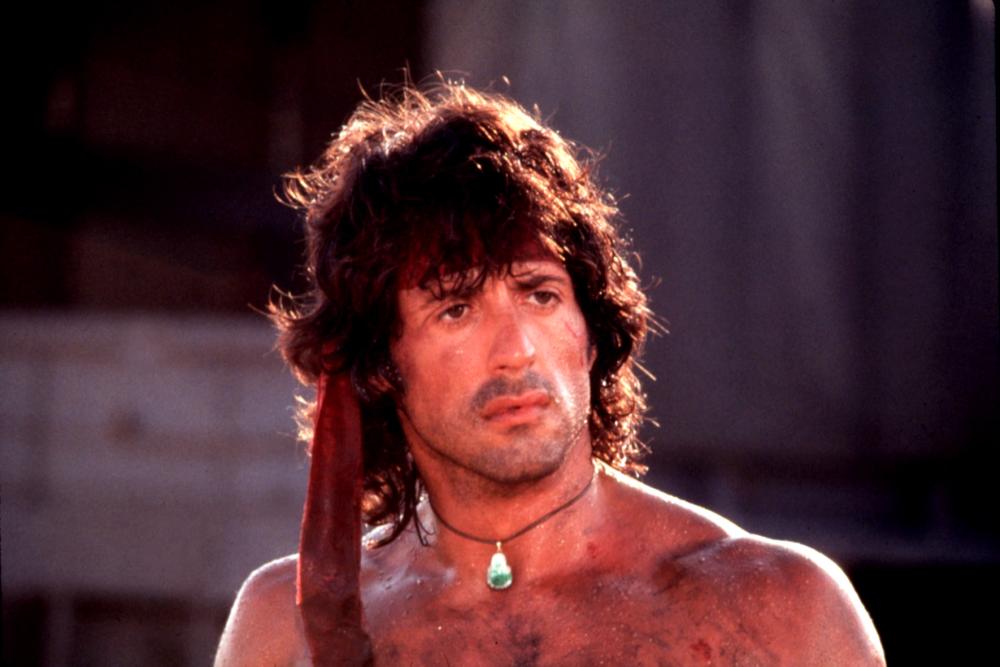
“Rambo: First Blood 2” is a hilarious sequel to the understated “First Blood.” While “First Blood” was a solemn and touching indictment on the treatment of veterans, “Rambo 2” is pure 80’s action schlock- and there’s nothing wrong with that, of course. It’s indicative of Stallone’s period in his career, something even more evident in his Rocky films. In the first Rocky film, we see a humble Rocky wearing worn-out sports clothes and living in a gritty environment. But when we get to part four, Rocky is wearing designer clothes and the soulful score by Bill Conti is replaced by 80’s synth and rock ballads.
The plot is expectedly ludicrous: Rambo is called back in action on a covert mission in Vietnam to investigate possible POWs. If he finds anything, he’s only supposed to take pictures, but instead, Rambo slaughters some miscellaneous Vietnamese troops and rescues a prisoner. The government entity, led by slimy Marshall Murdock (Charles Napier), never really wanted to admit the existence of these POWs in the first place, so he orders his men to abandon Rambo. Rambo then must fend for himself and do what he does best, which naturally means killing a shitload of people – obviously. He also gets the golden opportunity to walk around shirtless so he can show off his awesome physique.
The image of a shirtless Rambo was parodied brilliantly in “Hot Shots: Part Deux.” If you saw that one before “First Blood 2,” it’s hard to take this film seriously. The idea to bring Rambo back in a warlike environment is a good idea, but the film misses the psychological edge of its predecessor. When Rambo gets tortured by the enemy, we only see glimpses of horrified recognition in his eyes, but none of the horror we saw in the first one.
There is some poignant political commentary, even if some dialog, particularly the ending monologue, can be a little hamfisted. Richard Crenna returns as Col. Trautman and brings some necessary class to the film. The film has an anti-authoritarian vibe, similar to the first one, though the third one would relegate itself closer to Reagan’s view of American supremacy.
But at the end of the day, it’s just bare-chested Stallone killing a shitload of people. It’s a lot of fun and perfect for a beer-fueled Saturday night.
9. Extreme Prejudice
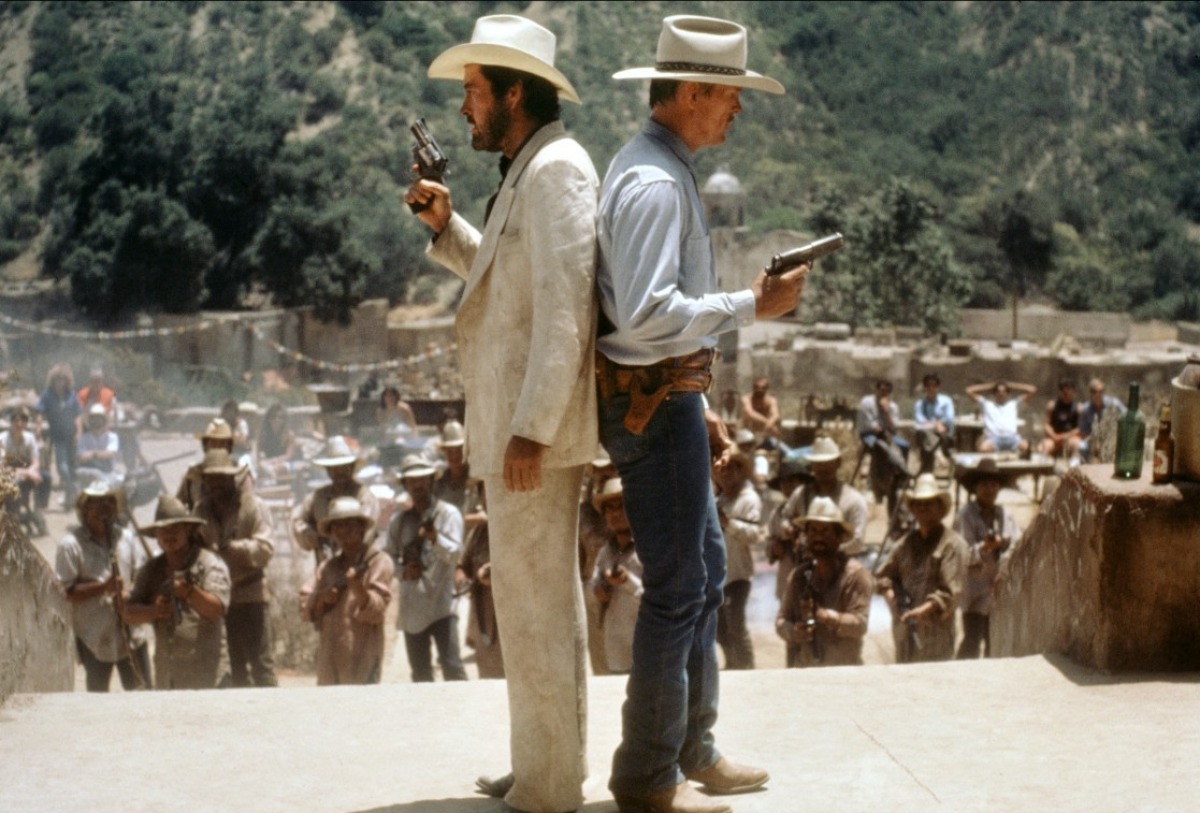
You can’t talk about manly movies without once mentioning the work of Walter Hill. This is a man who’s made nothing but male-oriented movies. On the surface, they might seem like mindless action fodder. There is certainly a pulp sensitivity to his films – he isn’t aiming to make high art. Like John Carpenter, Hill makes unpretentious genre films, but just like Carpenter, there is often more substance to his work than people give it credit for.
His 1975’s debut “Hard Times” is as much about the desperation during the Great Depression as it is about bare-knuckle boxing. “The Driver” is as much about the main character’s alienation as it is about his fastidious driving skills. “Southern Comfort” is as much a metaphor for the Vietnam War as it is about surviving evil hillbillies. As with his most underrated feature and subject of this segment, there’s much more to “Extreme Prejudice” than meets the eye.
“The only thing worse than a politician is a child molester!” barks cigar-chomping sheriff Hank Pearson (Rip Torn in a short but memorable role), as he and Jack Benteen (Nick Nolte) are on their way to face some potential drug mules. The night before, Benteen and Pearson confronted a drug mule in a bar, which led to this suspect being gunned down. Benteen regrets this, as he knows very well that many like them have no other prospects to make ends meet. Benteen even admits to having smoked dope in the past with Cash Bailey (Powers Boothe), an old friend who has now become a high-rolling drug kingpin.
At the time of this film release, the drug war had become a top priority of the Reagan administration and the consequences have been devastating – sadly, the current American Attorney General, Jeff Sessions, doesn’t seem to agree. Benteen knows the system isn’t working, but it doesn’t matter because his loyalty is to the law. Similar to many of Hill’s cast of characters, Benteen has a code he must abide. It might not make him morally right in everything he does, but it’s his allegiance to this very code that keeps him from losing his soul.
In “Extreme Prejudice” we can also see the misuse of patriots, as we have seen time and again in American history. A group of soldiers (which includes William Forsyth and Clancy Brown) are being misled by a corrupt army officer, Major Paul Hackett (Michael Ironside), to do his dirty work.
These very soldiers are reported to have been killed in action, all under the guise of a secret operation that will make America safe in the long run. The mission they risk their lives for has nothing to do with protecting their country. It ends up being about money, as it usually is. It’s a familiar story, told time and time again in history.
But one could easily ignore the film’s political subtext and just enjoy the action. It’s a genre picture, after all, and it aims to entertain. The finale shootout is a very reminiscent of “The Wild Bunch” – since Hill had been the assistant director of Sam Peckinpah, this doesn’t come as much of a surprise.
8. Gladiator
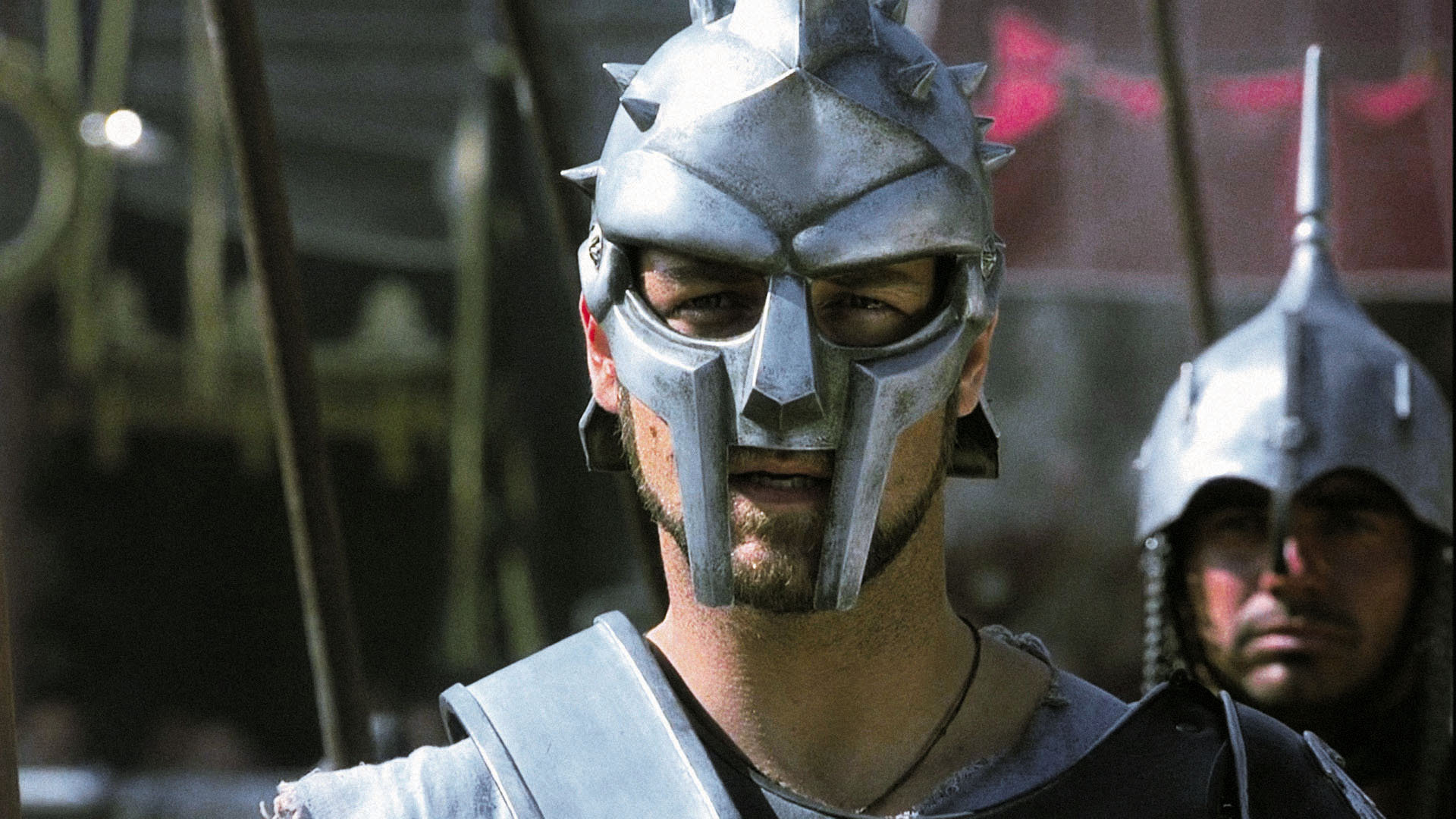
“Gladiator” is still beloved, though it has received some critical scrutiny, particularly with its lack of historical accuracy. Ridley Scott has cited that he wanted a more realistic depiction of Rome and though the film is filled with details that would make history buffs cream their pants, it’s not even remotely historically accurate.
Despite this, the film still gets a pass among history buffs, especially in comparison with Scott’s Crusades epic “Kingdom of Heaven” or his inept Christopher Columbus epic “1492: Conquest of Paradise.” Both of these films are universally panned for its laughable historical depiction. From a historical perspective, “Gladiator” seems more innocuous and gets closer to the spirit of the times, while “1492” suffers from the outdated myth of Columbus as this misunderstood hero while in reality, he was nothing more than a genocidal lunatic.
But I think the main reason that “Gladiator” gets a free pass from history buffs is the central performance of Russell Crowe. Compare that to the incredibly bland Orlando Bloom in “Kingdom of Heaven” or the hilarious accent of “Gerard Depardieu.” Crowe, who had been around for quite awhile before this film, became an instant star as the awesomely named Maximus Decimus Meridius. Maximus is a noble Roman general who is forced to become a gladiator in order to avenge the death of his wife and child.
Simply put, Maximus is a complete badass from start to finish. The epitome of badassery is undoubtedly the scene in which he easily dispatches several ironclad gladiators – decapitating the last one with two swords, no less. The bloodthirsty audience isn’t happy with the result. ”Are you not entertained?” Maximus quips. But it’s not just his combat skills that makes Maximus such a badass – it’s his loyalty to a certain code. This is a man who is willing to live and die for the dream of Rome, a dream that would inevitably be destroyed by Commodus (Joaquin Phoenix).
In the film, Maximus was chosen by Marcus Aurelius (Richard Harris) as his successor, but is murdered swiftly by his son Commodus so he can claim the throne. This didn’t happen in real life, but the real Commodus is regarded by historians as the one who jump-started the fall of the Roman empire by his selfish reign. Which included an extravagant amount of political and random assassinations.
One might wonder if the dream of Rome is worth dying for, especially when we look at it through our modern eyes. The Roman Empire was built on the backs of slaves, as did the American Empire. Maximus himself comes faces to face with this fact when he’s forced to become a slave and gladiator. The dream of Rome was a irredeemably flawed one, but regardless of the shortcomings of Rome, to have principles and to live by a certain code is a precious thing. It’s what gives us nobility.
Before he and his troops venture into battle, he tells them, ”What we do in life, echoes in eternity.” But aside from this being a fantastic line, it signifies the character’s dedication to his warrior code, to fight for what you believe in, to die for it. The retired gladiator Proximus (Oliver Reed, who died during filming) echoes similar sentiments when he talks about the life and death of the gladiator: “Ultimately we’re all dead men. Sadly we cannot choose how but what we can decide is how we meet that end, in order that we are remembered as men.” You fight and you die, but a noble death is greater than a purposeless life. In short, Maximus is the kind of man most men wish to be.
7. Heartbreak Ridge
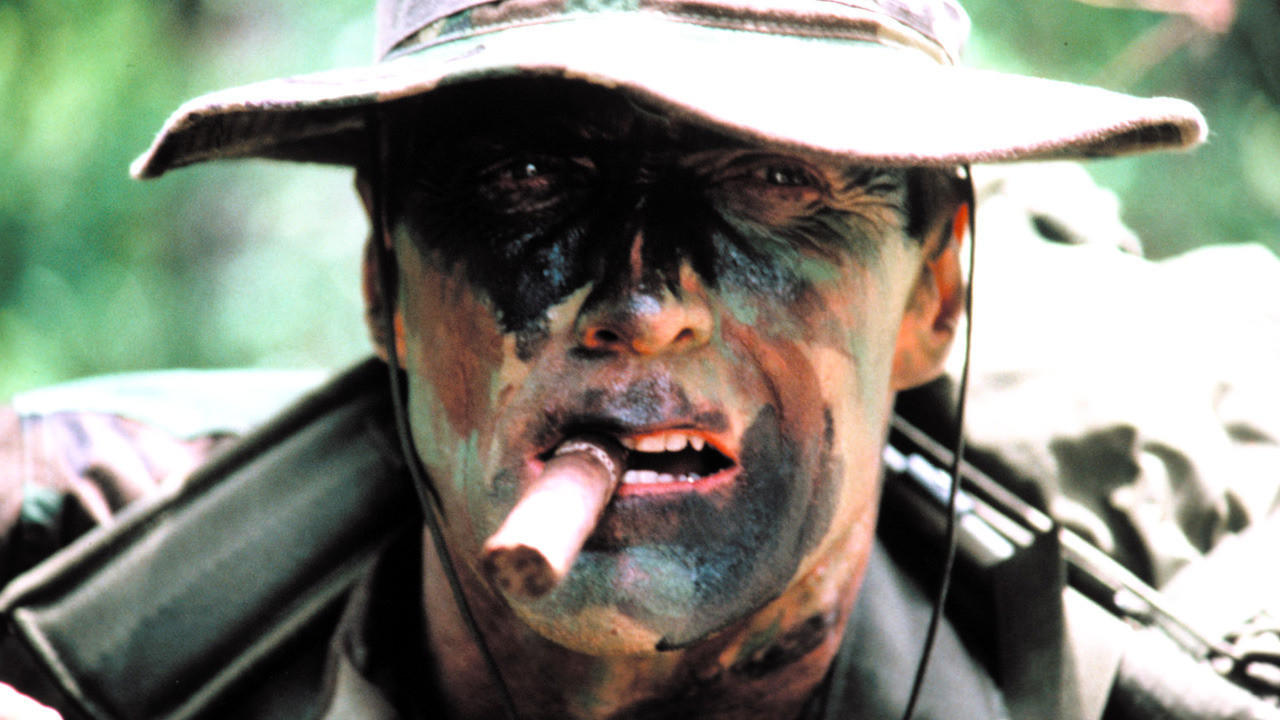
Clint Eastwood naturally had to be on this list. If you’re writing a list of Top 10 Manly Films, you gotta have Eastwood in there, the epitome of cinematic machismo. There is only so much to choose from. His filmography is packed with awesome masculinity – which is still going on at the ripe old age of 87. Out of all his films, it was “Heartbreak Ridge” that stood out among all of them, not because it’s his best movie but because it’s his most entertaining one.
The opening sets the tone: Sergeant Gunnery Highway (Eastwood) is sitting in the drunk tank, reminiscing Army stories to a young delinquent. A giant of a man starts to hassle Highway, and Highway warns him in in the most poetic fashion, ”Be advised. I’m mean, nasty and tired. I eat concertina wire and piss napalm and I can put a round in a flea’s ass at 200 meters.” When the giant refuses to comply, Eastwood easily whoops his ass: ”Why don’t you just sit there and bleed awhile before you taste some real pain?” This is only the start for a series of badass (and hilarious) quips as Highway is tasked to train a group of undisciplined jarheads.
The film has been criticized for not being a realistic portrayal of Marine training or actual combat. There was even some offense taken by the Marine Corps, which had initially supported the film, only to retract their support after viewing the rough cut, mostly due to its foul language. None of these facts should detract from its incredible entertainment value. From the dialog to the memorable characters, this film is an endlessly rewatchable treat.
6. The Dirty Dozen
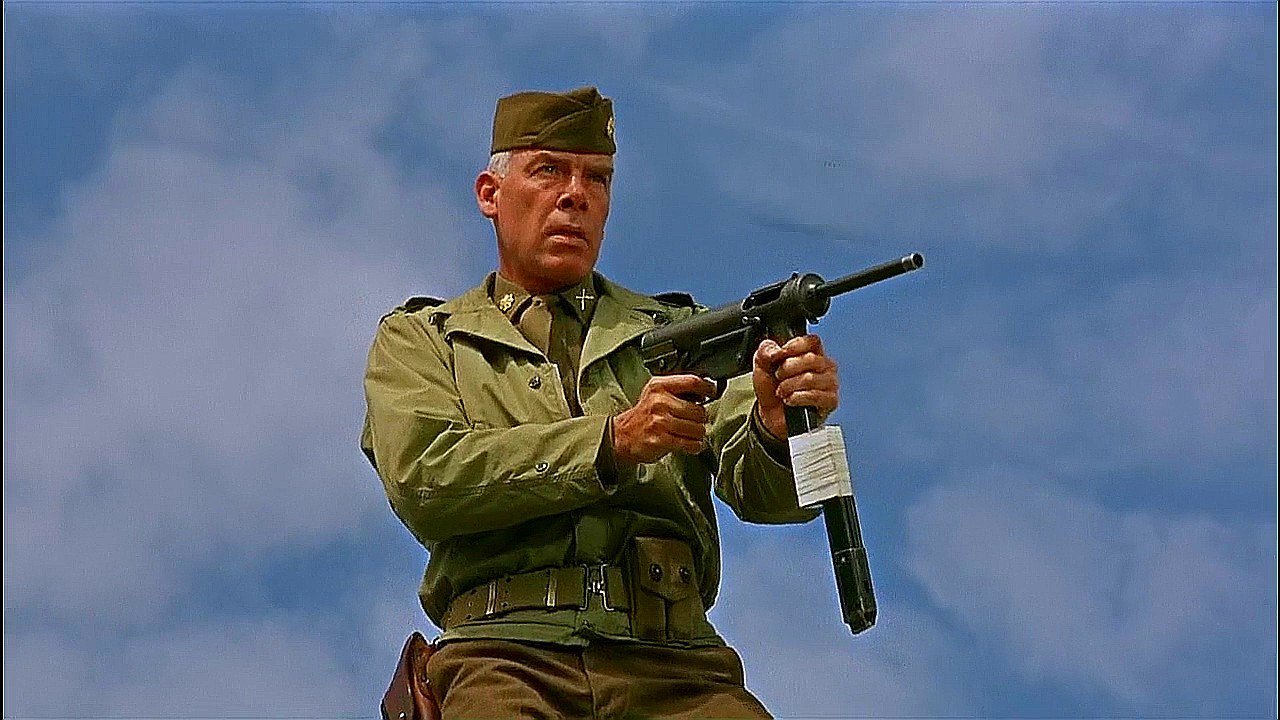
“The Dirty Dozen” is another one of those war films that is not renowned for its realism. The film was based on a book, which in turn was based on on a real-life group called the ”Filthy Thirteen.” The star himself, Lee Marvin, derided this film for being nothing more than a ”dummy moneymaker” and that it had nothing to do with the (Second World) war.
Marvin certainly belongs on this list, as he one’s cinema’s most famous alpha males, but he was, admittedly, a pain in the ass to work with. On the set of “The Dirty Dozen,” Marvin would show up bitterly drunk, which would enrage fellow star Charles Bronson (who threatened to punch him), and would even make cowardly racist remarks about Jim Brown (according to the biography of Ernest Borgnine, who also said that he never dared to say any of those things in front of Brown’s face).
In all fairness, most of the famous cinematic alpha males were a pain in the ass. There are enough stories about the likes of John Wayne, Sylvester Stallone, Bruce Willis, and so on, about how too much fame and money can do a lot of damage to the soul. Their egos would get bloated, their bad habits would be accepted, and pretty soon they start acting like divas. So it goes.
Setting all of this aside, “The Dirty Dozen” is a endearing product of its time, a perfect crowd pleaser for a group of manly men. The appeal of the film isn’t the realism, it’s the camaraderie between the main characters. It’s seeing these individualists become a team. Not all of these men are exactly sympathetic. Some have little remorse for their crimes – especially in the case of Archie Maggot (Telly Savales), a psychotic religious lunatic who feels that God is telling him to murder loose women.
The film doesn’t soften their rough edges. None of them really have a heroic moment in the end. Their basic mission is just to kill as many Nazi officers as possible. You want them to make it, yet you can’t help but feel a little bad in the end when they commit a merciless killing spree of unarmed men and women. The director, Robert Aldrich, was even offered a Best Director nomination if he could cut out this particular scene, but Aldrich refused, stating, ”War is hell.”
The film, clocking almost two and a half hours, gives adequate time to its diverse characters. Marvin does excellent work, despite the reported problems on set, but it’s the Dozen themselves who steal the show. Everyone has their own personal favorite: some prefer slow-witted Pinkley (played by a fresh-faced Donald Sutherland), some prefer the brawny Posey (Clint Walker), or they prefer Jefferson (Jim Brown), who has the most memorable action in the end. I personally think that Franko (John Cassavetes), the biggest troublemaker of the dozen who by the end becomes a loyal team member, has the best arc in the film. No matter how many times you’ve seen this film, you still feel sad when many of them perish.
Many filmmakers try to recreate the magic of “The Dirty Dozen,” but none of them managed to do it as well as the original. The original will always be the best.